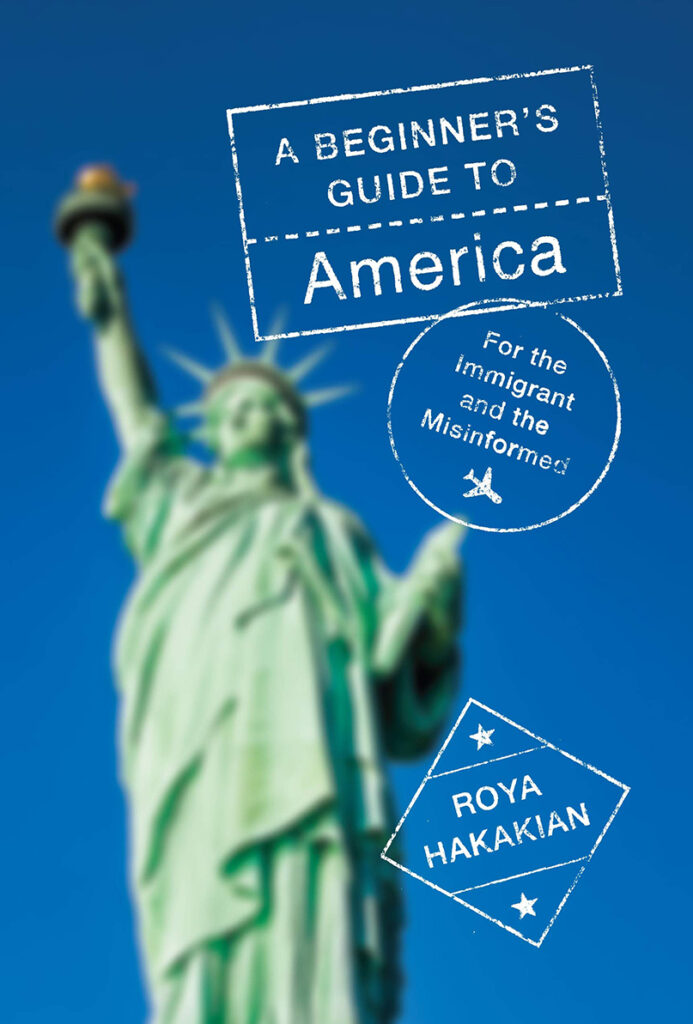
Woodbridge writer pens a guidebook for immigrants – and a love letter to America
By Stacey Dresner
In her 2005 memoir Journey from the Land of No, Roya Hakakian wrote about her life as a Persian Jew in her native Tehran and her experiences as a teenager during the Iranian Revolution.
Hakakian and her mother eventually fled Iran after a rise in antisemitism and other social and economic issues. In 1985, at the age of 19, she arrived in New York as a refugee seeking political asylum.

Now, after living in the states for 36 years, Hakakian has written A Beginner’s Guide to America: For the Immigrant and the Misinformed (Knopf, March 16, 2021). The book, which will be released next week, includes a cornucopia of need-to-know information for immigrants on topics such as landlords, job counselors, English as a Second Language classes, America’s over-the-top consumerism; how to navigate romance and sex with an American partner, and more.
She refers to the book as a guide, but in many ways it is a memoir of Hakakian’s own experience, and that of others who arrived here from other countries.
Hakakian graduated from Brooklyn College and worked as a producer for the ABC News’ Documentary Unit, before becoming an associate producer for 60 Minutes. She is also the author of Assassins of the Turquoise Palace, two collections of poetry in Persian, and numerous essays that have appeared in The New York Times, The Wall Street Journal, and on NPR’s All Things Considered. Since 2015, she has taught at THREAD, a writing workshop at Yale, and is a fellow at the Davenport College at Yale. She lives in Woodbridge with her husband and their two teenage sons.
The Jewish Ledger recently spoke to Hakakian about her new book.
JEWISH LEDGER: Your new book is called A Beginners Guide to America, but it reads like a memoir. Why did you choose to write the book in this format?
ROYA HAKAKIAN: In 2016 when the rhetoric against immigrants started to get dangerously negative, and having been a refugee and immigrant myself, I felt that I had to somehow contribute to the “non-conversation conversation.” It wasn’t really a conversation, it was mostly a conflict. So I thought, if I just wrote a regular narrative, say a book in third person or reportage – which I actually did do – it would go either to the left or the right. I didn’t want it to belong to either one. I wanted to make people feel something that they couldn’t immediately brand or identify as fiction or nonfiction, and that was primarily to get people to see that they need to listen to the immigrants’ accounts; that the immigrant has something to say that transcends the debate. I thought if I use the third person I’m doing what everybody else was doing; something that I had done. And so I thought, what if I went somewhere else. What if I crafted a different voice that made people take a second look or do a second take and say, ‘This is slightly jarring.’ And that’s how I kind of came up with this voice.
You write about the loneliness immigrants can feel and the “loss of mastery” they experience when coming to a new country. That was new to me. So it seems this book is useful even for those of born here.
RH: Precisely. There was this talk that migrants are coming here to rape and pillage and do all this damage and I was thinking, “If you only knew how disorienting this process of displacement and uprooting is, then you might think twice that they’re coming to do all of these sorts of dangerous things.”
I’ve been told many times, ‘Oh you must be delighted that you’re here because Iran is in a state of crisis economically and politically.’ The truth is that, however delighted anyone might be in coming here, the beginning years are jarring. The idea of [starting] from scratch just upends one’s life. So, I thought it was important to bring people into that experience so that the next time someone turns around and says they’re coming here to commit crime, you would say, “They don’t speak the language and are so bereft by this grand journey that it would be, not impossible, but really difficult for anyone to then find the resolve to go on to commit crimes. Which isn’t to say that immigrants can’t do that. They can, but the idea that I wanted to convey was for people to see that the vulnerability is at such a high level, that in many ways these initial years can become important bonding years between the immigrant and the community of American-born citizens. You feel so vulnerable at first that whoever does a single act of kindness, it kind of becomes etched into your memory. I think that’s pretty much how we all are when we’re new to a place we’ve never been, among people that we feel vulnerable about being among.
You write about feeling different and disoriented when you first landed in America. Do you remember how you felt the day you arrived?
RH: I don’t remember what I was wearing, or what I was carrying, or what I ate that day. But I do remember exactly what it felt like. And I think most of us are that way – we may forget the physical details, but the emotional truth that we experience, the impactful moments, somehow leave their marks on us.
I remember what it was like to arrive at the customs window trembling because I didn’t know if I would I get in. Iran and the U.S. were in a standoff. Would somebody then say, ‘You can’t pass?’ I was thrilled and afraid of everything at the same time, and I think those are some overarching experiences that we all have as immigrants.
We keep talking about Mexican immigrants as opposed to Chinese immigrants and Indian immigrants, as if these ethnic identities make us so different that we become completely separate communities of people who don’t share in certain overarching and grand experiences. And I think the experience of arriving here is one of those overarching experiences that we all, no matter where we come from, see in the same way and experience in the same way.
You talked about the five stages of arrival: disorientation, despair, fury, acquiescence, and assimilation. Which of these was most pronounced for you?
RH: I think for me, because I was so young – I was still a teenager – despite the fact that Iran was in a state of war with another country and it had undergone a revolution and it was under a dictatorship – still, I really I had not wanted to leave. In retrospect, it doesn’t make a lot of sense, because why wouldn’t you want to leave a place like that? But I didn’t. My friends were there. I felt that it was wrong to leave; when things begin to go bad you make a commitment to stay and try to repair things. And so in my teenage mind I thought, we should have stayed. I actually owe it to my mother who dragged me, all the way, despite my best effort to resist coming.
Also, I didn’t know English at all, and I had already wasted a year, in my mind, as a refugee in Europe. I thought, “I’m 19 years old, I should have been in college last year. And even though I don’t know English I’m going to start in college.” Which is exactly what I did, even though I had no idea what anyone was saying.
I was angry all the time. I was angry when people were kind to me. I was angry when people weren’t. I think I was just really a very hard person to reach at that time. I think language had a great deal to do with it. I couldn’t articulate any thoughts. And that always comes with a sense of humiliation; you feel that you appear less than you are.
You’ve been here now for 36 years and are a naturalized citizen. Do you ever still feel like that 19-year old immigrant?
RH: I feel assimilated. This is far more home than Iran ever was. I’ve spent more years here now than I had spent in Iran. But, I think the upshot of all these experiences has been that I find I am more more than the sum of these two countries and these two identities. At the end of the day, it isn’t only that I add up to an Iranian American, there is something bigger than that. And I think that’s a writer; someone who is committed to telling the truth; someone who has lived two lives in some ways, and recognizes that having lived these two lives comes with the responsibility of then transmitting the truth from one side to the other and vice versa.
You write about aspects of America that are positive and some that are not so positive,. But the book’s description also calls it a “love letter to America.” Is it a love letter?
RH: Yes – and I’m glad you said that the book does talk about the things that I see to be flaws, so to speak. I think my ultimate message is that, despite those shortcomings and flaws and errors, there’s still something here worth building upon and hanging on to. There’s still something here that is, in some ways, an important foothold for everyone else, everywhere else.
In many ways, I think America is not just important for Americans; I think America is important for so many other people elsewhere around the world who are trying to achieve the freedoms and the kind of democracy that we have, despite whatever still needs improving. So yes, it was a love letter.
Given the last four or five years, we as a people are losing sight of these beautiful things that are so important to recognize. There is so much that we take for granted because they’re always here and we assume that they came with the place. They didn’t. There were people a couple hundred years ago who fought for every single bit of these things that we so richly enjoy. So first I wanted to make people see those things; to recognize that they’re not entitlements. They can be lost. Then allow all of us to cherish and celebrate them, and if they need improving, improve them.
Whatever it is that we are disgruntled about, we still have to recognize that there are certain founding principles – certain original ideas – that are still great and make our lives so much more meaningful, beautiful and free than the place that I came from, that it makes it worth trying to come together as a nation and work on them.
And so, yes, I probably did intend to write a love letter in the hopes that native-born Americans could see what I was seeing.








 Southern New England Jewish Ledger
Southern New England Jewish Ledger









